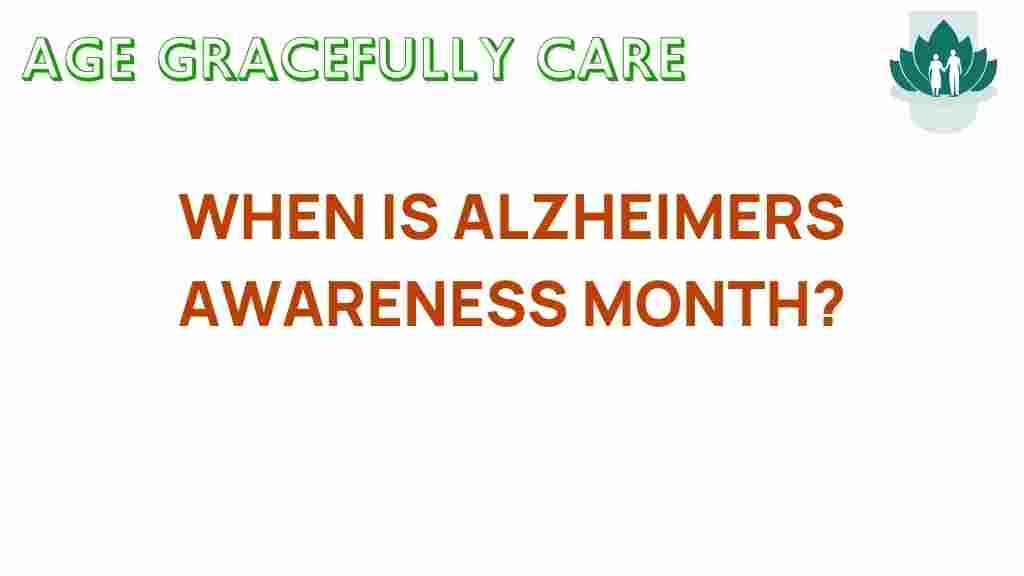Unraveling Alzheimer’s Awareness Month: When and Why It Matters
Every year, millions of individuals and families are affected by Alzheimer’s disease and other forms of dementia. As we strive for a world where these conditions are understood and managed more effectively, Alzheimer’s Awareness Month plays a crucial role in fostering education, advocacy, and community support. This article delves into the significance of this month, its historical context, and what you can do to help raise awareness and support research.
Understanding Alzheimer’s and Its Impact
Alzheimer’s disease is a progressive neurological disorder that leads to memory loss, cognitive decline, and, ultimately, the inability to carry out simple tasks. It accounts for 60-80% of dementia cases, making it a leading cause of disability and dependency among older adults. Here are some key facts about Alzheimer’s:
- Over 6 million Americans are living with Alzheimer’s.
- Every 65 seconds, someone in the United States develops the disease.
- Alzheimer’s is the sixth leading cause of death in the United States.
Understanding the symptoms and progression of Alzheimer’s is essential for early diagnosis and intervention. Symptoms often begin subtly, with individuals experiencing difficulty in remembering recent conversations or events. As the disease progresses, they may also struggle with language, disorientation, and changes in behavior.
The Origins of Alzheimer’s Awareness Month
Alzheimer’s Awareness Month is observed every November, a time for individuals, organizations, and communities to come together to promote awareness and education about Alzheimer’s and other dementias. The initiative started in 1983 when the Alzheimer’s Association was founded, and it has since expanded to include various activities aimed at educating the public and advocating for those affected by the disease.
Why Alzheimer’s Awareness Month Matters
This dedicated month serves several purposes:
- Education: Increasing public knowledge about Alzheimer’s and dementia helps reduce stigma and encourage early diagnosis.
- Advocacy: Promoting policies and funding for research fosters advancements in treatment and care.
- Support: Building a supportive community for caregivers and individuals living with Alzheimer’s can alleviate the emotional and financial burdens.
- Research: Highlighting the need for ongoing research can lead to improved therapies and, ultimately, a cure.
How to Get Involved During Alzheimer’s Awareness Month
Participating in Alzheimer’s Awareness Month is an excellent way to make a difference in your community. Here’s a step-by-step guide on how you can contribute:
Step 1: Educate Yourself and Others
Knowledge is power. Start by educating yourself about Alzheimer’s disease and dementia. Resources such as the Alzheimer’s Association provide comprehensive information on symptoms, care options, and research updates. Share what you learn with friends, family, and your community through:
- Social media posts
- Community workshops
- Informational flyers
Step 2: Advocate for Change
Advocacy is vital in pushing for policies that support individuals with Alzheimer’s. Reach out to your local representatives and express the importance of funding for research and support services. Consider participating in advocacy events or write to your legislators highlighting the need for:
- Increased funding for Alzheimer’s research
- Support for caregivers
- Improved healthcare policies
Step 3: Organize or Attend Community Events
Many organizations host events during Alzheimer’s Awareness Month, ranging from educational seminars to fundraising walks. Participating in these events helps raise awareness and funds for research and support. You can:
- Volunteer at local events
- Participate in fundraising walks, such as the Walk to End Alzheimer’s
- Host a community gathering to discuss Alzheimer’s and its impact
Step 4: Support Caregivers and Families
Caring for someone with Alzheimer’s can be overwhelming. Show your support by reaching out to caregivers in your community. You can offer assistance in various ways:
- Provide respite care or help with daily tasks
- Organize support groups for caregivers
- Share resources and information about local services
Troubleshooting Tips for Common Challenges
While participating in Alzheimer’s Awareness Month, you may encounter challenges. Here are some common obstacles and tips to overcome them:
- Challenge: Lack of engagement in community events.
- Tip: Use social media to promote events and highlight their importance.
- Challenge: Difficulty in finding reliable information.
- Tip: Refer to reputable sources like the Alzheimer’s Association or academic institutions.
- Challenge: Limited funds for organizing events.
- Tip: Collaborate with local businesses for sponsorship or donations.
Conclusion: The Power of Awareness and Advocacy
Alzheimer’s Awareness Month is more than just a time for recognition; it’s a pivotal moment for education, advocacy, and community support. By raising awareness about Alzheimer’s and dementia, we can foster understanding and promote early diagnosis, ultimately leading to better care for those affected. Whether by educating yourself, advocating for change, or supporting caregivers, your involvement can make a significant impact.
Let us unite as a community to honor those affected by Alzheimer’s and work towards a future where no one has to face this disease alone. Remember, every action counts, and together, we can make a difference.
For more information on how to get involved and support Alzheimer’s research, visit the Alzheimer’s Association.
This article is in the category Health and created by AgeGracefullyCare Team
